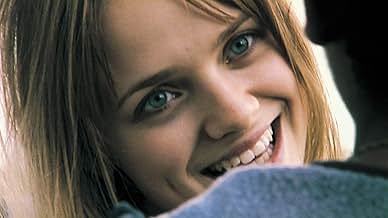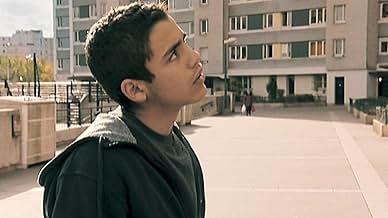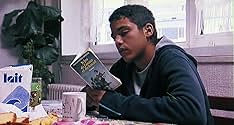PUNTUACIÓN EN IMDb
6,9/10
3,3 mil
TU PUNTUACIÓN
Krimo un chico tímido de 15 años se enamora de Lídia que es su compañera de clase, para poder asumir su amor por ella decide participar en la obra de teatro que iba a ser uno de sus amigos.Krimo un chico tímido de 15 años se enamora de Lídia que es su compañera de clase, para poder asumir su amor por ella decide participar en la obra de teatro que iba a ser uno de sus amigos.Krimo un chico tímido de 15 años se enamora de Lídia que es su compañera de clase, para poder asumir su amor por ella decide participar en la obra de teatro que iba a ser uno de sus amigos.
- Premios
- 16 premios y 5 nominaciones en total
Meriem Serbah
- Krimo's Mother
- (as Meryem Serbah)
Argumento
¿Sabías que...?
- CuriosidadesThe movie is dedicated Slaheddine.
- ConexionesReferenced in Leçon de cinéma: Arnaud Desplechin et Mathieu Amalric (2019)
- Banda sonoraWarini Werak Tergoud
Performed by Cheba Zahouania
Written and Composed by Cheikha Rimitti
Production: MLP / History
Reseña destacada
This movie is getting fresh exposure in France thanks to its win at Les Césars, or the "French Oscars" as other countries like to call them. Its success will probably mean that it now gets exposure outside the country, too, and I wonder how successfully.
Though an accurate and contemporary examination of France, the film's world is a foreign one, even to many people living here--the specificity of the setting (the projects, in a "suburb" of Paris), the language (rapid-fire, slangy, "vulgar", and peppered with "verlan", a street language of inverted syllables--the word itself could translate as "wardsback", and how anyone will translate this dialogue I have no idea), and the behavior (mostly arguing--strident, pushy, beautifully repetitive) may not play clearly outside of France. I'm not sure how clearly it plays here, or how willing people are to watch it, especially as it turns the idea of the scary bad French projects somewhat on its ear.
This isn't a criticism of the movie; on the contrary. Kechiche has shot a riveting cross-section of teenagers growing up in social housing, in broken homes and poverty, who lack the tools of expression, and who have adopted the posturing of the wounded (and, in the story, almost entirely absent) adults who raise them, attacking (the movie unfolds at a near-constant level of verbal aggression) and dodging ("esquiver" means "to dodge" or "to evade") one another's attacks with all they can muster.
The film's intensely political side feels almost accidental; in its unfolding, it has great heart, and its actors, who are apparently mostly amateurs from around the shooting location, are outstanding. On the whole, it reminded me a great deal of David Gordon Green's George Washington: a simple love story set against a landscape of poverty, played out frankly and honestly, allowed to unfold at a distinctly un-Hollywoodian rhythm. If Green's film is more beautiful cinematic ally, L'Esquive is more concentrated, more unflinching in its examination of the deep repercussions and violence of economic, social, and familial hardship. Its statement that France is no longer a country of the French-of-French-ancestry, and that its refusal to accept its own transformation does not mean its lost generation accepts its loss, could not be more clearly nor more poignantly made.
Without spoiling or going into detail, there are things about the plot that are implausible, things that probably hurt the film overall, but watching this movie for plot is like watching Ocean's Eleven for social insight. This is a positive study of character in a bad situation, of a stratum of society rarely filmed and still more rarely treated as fairly as it is offered up here, beautifully and eloquently.
Though an accurate and contemporary examination of France, the film's world is a foreign one, even to many people living here--the specificity of the setting (the projects, in a "suburb" of Paris), the language (rapid-fire, slangy, "vulgar", and peppered with "verlan", a street language of inverted syllables--the word itself could translate as "wardsback", and how anyone will translate this dialogue I have no idea), and the behavior (mostly arguing--strident, pushy, beautifully repetitive) may not play clearly outside of France. I'm not sure how clearly it plays here, or how willing people are to watch it, especially as it turns the idea of the scary bad French projects somewhat on its ear.
This isn't a criticism of the movie; on the contrary. Kechiche has shot a riveting cross-section of teenagers growing up in social housing, in broken homes and poverty, who lack the tools of expression, and who have adopted the posturing of the wounded (and, in the story, almost entirely absent) adults who raise them, attacking (the movie unfolds at a near-constant level of verbal aggression) and dodging ("esquiver" means "to dodge" or "to evade") one another's attacks with all they can muster.
The film's intensely political side feels almost accidental; in its unfolding, it has great heart, and its actors, who are apparently mostly amateurs from around the shooting location, are outstanding. On the whole, it reminded me a great deal of David Gordon Green's George Washington: a simple love story set against a landscape of poverty, played out frankly and honestly, allowed to unfold at a distinctly un-Hollywoodian rhythm. If Green's film is more beautiful cinematic ally, L'Esquive is more concentrated, more unflinching in its examination of the deep repercussions and violence of economic, social, and familial hardship. Its statement that France is no longer a country of the French-of-French-ancestry, and that its refusal to accept its own transformation does not mean its lost generation accepts its loss, could not be more clearly nor more poignantly made.
Without spoiling or going into detail, there are things about the plot that are implausible, things that probably hurt the film overall, but watching this movie for plot is like watching Ocean's Eleven for social insight. This is a positive study of character in a bad situation, of a stratum of society rarely filmed and still more rarely treated as fairly as it is offered up here, beautifully and eloquently.
- randolphtaco
- 7 mar 2005
- Enlace permanente
Selecciones populares
Inicia sesión para calificar y añadir a tu lista para recibir recomendaciones personalizadas
- How long is Games of Love and Chance?Con tecnología de Alexa
Detalles
- Fecha de lanzamiento
- País de origen
- Idioma
- Títulos en diferentes países
- Games of Love and Chance
- Localizaciones del rodaje
- Saint-Denis, Seine-Saint-Denis, Francia(Cité des Francs-Moisins: housing complex, Rue du M.al Lyautey: police control)
- Empresas productoras
- Ver más compañías en los créditos en IMDbPro
Taquilla
- Recaudación en Estados Unidos y Canadá
- 8085 US$
- Fin de semana de estreno en EE. UU. y Canadá
- 2529 US$
- 4 sept 2005
- Recaudación en todo el mundo
- 1.747.263 US$
- Duración1 hora 57 minutos
- Color
- Mezcla de sonido
- Relación de aspecto
- 1.85 : 1
Contribuir a esta página
Sugerir un cambio o añadir el contenido que falta

Principal laguna de datos
By what name was La escurridiza, o cómo esquivar el amor (2003) officially released in India in English?
Responde






















